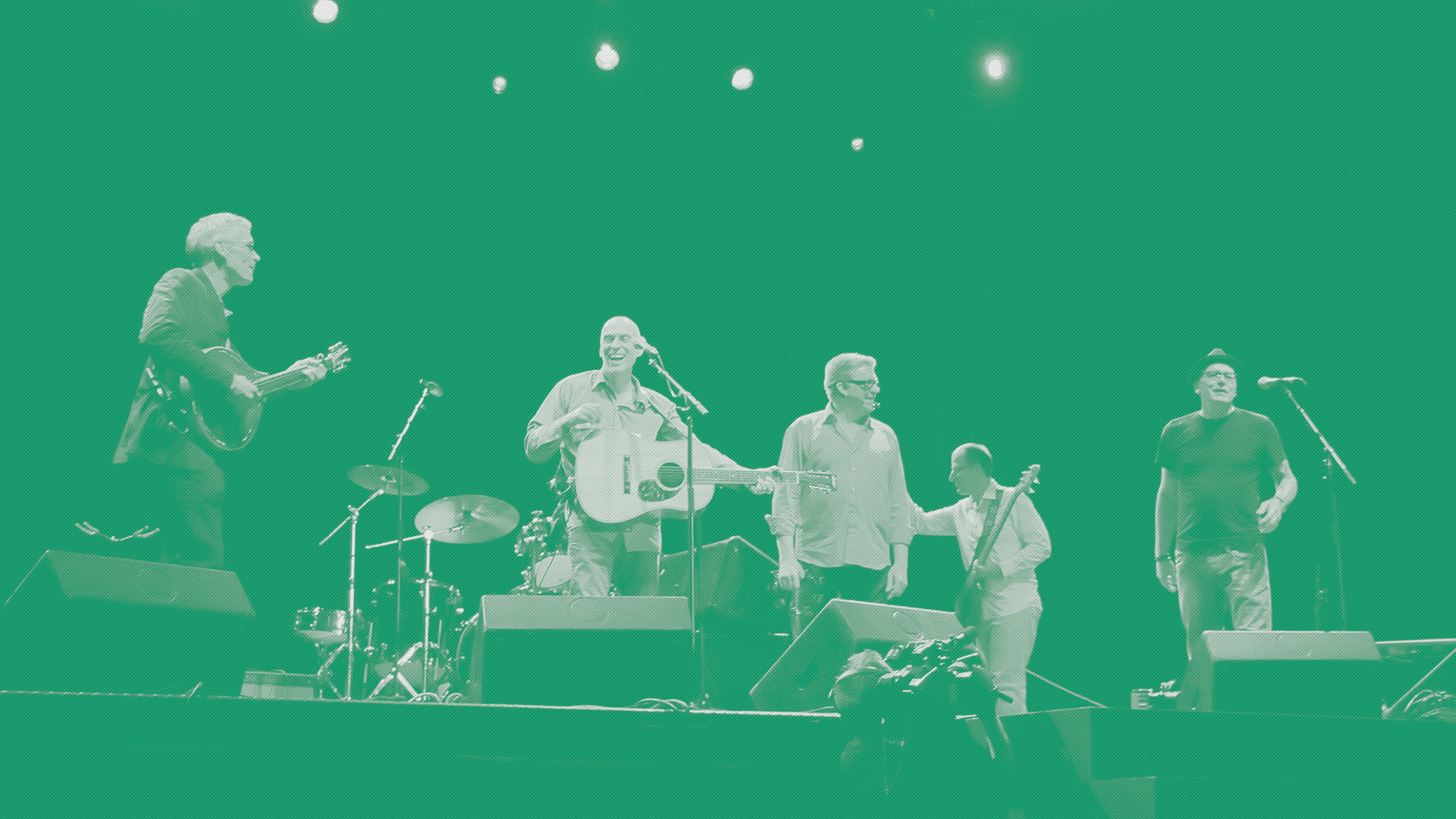
Soundtrack To My Youth: How Spirit of the West’s folk-rock sound impacted my ideas about art and identity
It was the May long weekend, 1995, and the night before my 15th birthday. My high school music department — where I was in the choir — had made it to the nationals, being held that weekend in Calgary. I had never been to Calgary, let alone somewhere that far away without my parents, let alone with hundreds of other teenagers. The legal drinking age in Alberta was one year lower than in our home province of Ontario, and Ontario had one more year of high school than Alberta. Both of these things worked in our favour.
One night, my hotel suite of half a dozen Grade 9s made our way over to a room of fifth years who could legally purchase alcohol, and the party began. I remember seeing the vodka start to fill up in the coffee mug I had found in the room, and thinking about the fact that my parents were all the way across the continent. Then, I remember going back for refills more than once.
Spirit of the West, a metamorphosing musical ensemble from Vancouver, had been in existence for over a decade at this time. While they initially made the rounds of the West Coast folk circuit, they also crossed the line into rock’n’roll.
I first heard their fourth album, Save this House, a couple of years after its 1990 release, when I was a pre-teen. Someone in my cabin at camp owned a copy of the album. I fell in love with it, and purchased my own copy with my babysitting money.
The lyrics of “Home for a Rest,” the second song on Save This House, recount a trip to the U.K. in which the band members did very little other than drink. True story, apparently; sounded like fun to me, at the time.
Back in Calgary, there were several parties happening throughout the hotel. Most of the attendees were smart enough — or sober enough — to know to stay in their rooms and be quiet.
I’m still not really sure how this happened, but I do remember walking down the hotel hallway, trying to grab onto the wall for support. Then I remember opening my eyes again the next morning, but this time I was lying on a couch in the common area of the teachers’ suite. One of the teachers was practicing the jazz band’s bass line because the bassist had been at the same party as I was the previous night and it was clear he was not going to be performing.
When the weekend was over, we flew home to Ontario, and most of us were suspended from school.
What could I have been thinking? I was a teenager, a shy one, and I wanted to be seen as less innocent. I wanted to separate from my parents. But it was also my birthday, a long weekend, and time away from home with a bunch of other teenagers. I wanted to have not just a good time, but a fantastic time; I wanted to transcend the limits of my teenage existence in time and space and live out my fantasies and dreams.
Reflecting on that tumultuous weekend in Calgary, it's clear to me now how the allure of rebellion and the desire for independence often intertwined with the soundtrack of my youth.
As I stumbled through hotel hallways and woke up on unfamiliar couches, the lyrics of “Home for a Rest” echoed like a siren call to abandon inhibitions and embrace the moment. While that song may have glamourized drinking to me in those wild, carefree days of my teens, it also served as an expression of my yearning for adventure and self-discovery — an expression which resonates through Spirit of the West’s discography, and has since offered me a sense of connection beyond the drunken reverie of one birthday weekend away from my parents.
Celtic music & drinking songs
I later learned that the members of Spirit of the West were surprised that “Home for a Rest” became such a big hit — it was never intended as a single. As it happens, most of the band’s other songs deal with political issues.
“Political,” from their third album — reprised twice in entirely different renditions on later albums, going from slow and folky to fast and rocky and then orchestral — and probably their second-most loved tune after “Home for a Rest,” is about the troubles that can occur when macro politics interfere with personal ones.
The title song on Save This House is about how we should treat the environment with the care we would give our own home. The album which preceded that record, 1988’s Labour Day (where “Political” first appears), questions progress and economic greed from different angles on “Darkhouse” and “Profiteers.” The last song on Labour Day, “Take It From the Source,” is one of the first in the CanRock canon that I can think of that directly and explicitly calls out homophobia.
Maybe it was the lighthearted nature of “Home for a Rest” that appealed more widely to listeners — particularly with its infectious melody anchored in the most energetic Celtic flute playing I had ever heard, incorporating and transforming traditional Irish reels “Castle Kelly,” “Glass of Beer,” and “Swallow's Tail.”
Indeed, Celtic reels have a long history of intertwining with drinking culture, drawing on the importance of pubs and live music in Ireland, from traditional ancient Irish sounds and the folk revival of the 1960s to some of the great contemporary rock bands since — all heavily influenced by the convivial, ‘raise a pint’ vibe long associated with Irish life.
Cultural identity & personal connection
When I first heard “Home for a Rest,” I was both amazed and disconcerted. I wasn’t sure if I was hearing my music — or my parents’, given the song’s traditional leanings. And perhaps that fine line between new and old wasn’t surprising, seeing as folk music can often tap into times and places otherwise unfamiliar to both the musicians and listeners. There’s a sense of longing and nostalgia that drives these connections, but the new context also creates opportunities to develop identities and relationships.
Rock music, it has been said, is “direct communication;” it is “ahistorical.” This is not to create an overly simplistic division between folk music and rock music but rather to explain why, when listening to Spirit of the West, I wasn’t sure if I was preserving the past, existing in the present, or fantasizing about the future. Spirit of the West’s music blurred those lines, especially as they began experimenting with more of a rock direction in the years following Save This House.
My parents are big fans of folk music, from any culture. We are not Celtic, but Celtic folk music infiltrated my childhood. I was also trying to build my own musical tastes, in accordance with what other teenagers were listening to. There was no question in my mind that I loved Spirit of the West — I just wasn’t sure if I was supposed to or not. In fact, I used to find it annoying when I played Spirit of the West at home and my parents actually liked it.
Although the song “Home for a Rest” has Celtic music deeply embedded in it, it’s clear that the “home” the band is referring to is Canada.
Geoffrey Kelly, one of the original SOTW members who played on Save this House, was born in Scotland (John Mann was born and raised in Western Canada, as were most of the other members who came later) and came to Canada at age nine. He said it was not until he began playing Celtic folk music as a young adult that he realized how deep a connection he felt. In the documentary Spirit Unforgettable, he recounts jamming with band co-founder J. Knutson on guitar while Kelly was on tin whistle. Mann would join the group soon afterward.
I think the band’s own exploration of identity, and how that played out in the music, was apparent and relevant to me.
Political awareness & growth
When I was a teenager, I wanted to be cool. Listening to Spirit of the West felt cool. But political issues were important to me, even then, and were not always regarded as cool. It was important to me that Spirit of the West wrote not just drinking songs, but also political ones.
Spirit of the West did not present like the popular Seattle grunge of the time, but perhaps some of the same sentiment was present. The deeper and more intellectually involved songs told of all the troubles the world was facing, while “Home For A Rest” implied let’s just forget it all and get drunk.
Of course, there’s more to it than that — Celtic music has always been powered by the desire for joy amidst hardship. Spirit of the West’s music brought that sentiment into renewed relevance.
Spirit of the West changed my notion of politics as uncool — and was not entirely out of step with the folk music revival of several decades earlier. It is noteworthy that the movement was inspired by Walt Whitman, who “attempted to find his place in the American society,” and the Beat Generation, who “represented sentiments that were boiling under the surface,” as Nan-Alice Espeseth writes in her 2008 thesis on folk musician Ani DiFranco.
I wasn’t the only one who recognized how SOTW married the ancient and the modern in their music, both sonically and lyrically. Their peers in the music world also took note.
"The [really aggressive and punky] way they chose to play very, very delicate, fragile acoustic Celtic instruments was incredible to me," fellow Canadian folk-rock musician, Alan Doyle, said of SOTW’s sound. "It was very influential — probably one of the most influential bands of my lifetime."
The thing that was striking to Doyle was how the band did not treat the past or their musical ancestors as delicately as one might expect. They brought the past into its fullest existence in the present by putting a modern spin on an age-old sound.
Connecting the past, present & future
All these years later, I still listen to “Home for a Rest.” It’s undeniably catchy — and for me it is imbued with memories. While I can be dismissive of that time of my life, it’s good to remember that it set the groundwork for everything that came later. After all, without all the tumult of our teenage years, most of us would not be who we are today.
Later in their career, SOTW wrote another song on their 1995 album Two Headed, which also means a lot to me. “Wishing Line” is about my birthday — or at least I like to think of it as such, because it mentions Ascension Day, which happens 40 days after Easter, around my birthday.
Where I had previously been drawn to the band for their fast-paced songs, this one is not. It does have a steady beat — the sonic equivalent of climbing up a mountain.
The lyrics paint a picture of historical beauty and trauma all culminating in one moment where someone makes a wish.
We might think of the past as unable to stand up to our full existence in the present. However, time and again this is disproven, as the past is just made up of many of these moments. History was once the incomprehensible present — and before that, the unimaginable future.
Spirit of the West sustained a career that lasted well over 30 years, continuing to draw on their Celtic and folk roots while evolving their sound along the way. Their work, and especially “Home for a Rest,” still resonates to this day — from wedding dance floors and school reunions to backyard gatherings of friends nostalgic for their youth. When I think back to when I first heard the song, and how the band’s music became a conduit to understanding how artists draw on culture and history, it reminds me of how critical art and music is in shaping our own awareness of who we are — and who we will become.
Read more

Sentries: Multifaceted Noise Rock

Step Into Little Stone Crow's World

